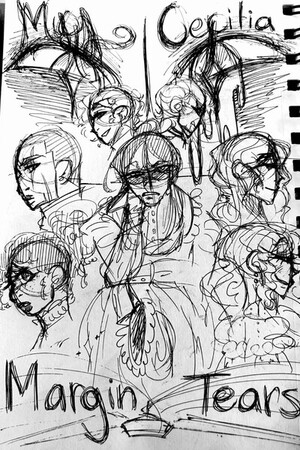Chapter 47:
The Action
Margin Tears: My Cecilia
She did not sleep, not anymore, not for a long time. She merely sat, boldly, unafraid in the library. She stared at the journal—and while she knew it was not hers, perhaps it was her only ally. That was how she chose to look upon it, a danger, a weapon, a threat, yet also the only other being around who she could find support in.
Its cover showed that, empty and lifeless. No animals remained, no birds or bear or stoat left in attempts to fill the void of the first left deer. All that remained was that damned star, bold and imposing.
Cecilia would not forgive for what she had been put through, for what her companions had been put through, all for the sake of pride and possession.
She would fight.
For Nero the Soldier. For Atison the Artist. For Peregrine and for Calliope and for Coriander. Even for herself. For everyone the story had twisted and stolen.
And if she could not save them, she would avenge them. To her dying breath.
…
The manor grew quiet that night, too quiet. Even the mice seemed to hold their breath in the walls, as though they too felt the weight pressing in. She had waited, restless, pacing the length of her narrow cot until the moment came when she could no longer bear silence as obedience.
She stepped into the corridor with no candle, only resolve. The air itself seemed to thrum, heavy with a presence she could not see.
So, the narrator’s voice slid through the darkness, smooth, omnipresent, amused. The little maid seeks to raise her head. Do you mean to spit at the hand that wrote you?
Cecilia swallowed what fear lingered between her tongue and throat. Her voice steadier than she had expected, she answered, “I mean to say that your hand is not the only one that matters.”
A chuckle stirred the air, low and curling. And whose hand would that be? Your own? Don’t flatter yourself. You are ink and margins, nothing more. You breathe only because I will it.
She stopped walking, lifted her chin into the empty hall. “If I am only ink, then you cannot explain why I feel the sun on my skin. Why I can taste the bread that burns in the oven. Why I grieve every time you’ve erased someone I care about.”
His laugh grew sharper, angrier. Care? Each of your frivolous little friends was a fiction twice removed, a scribble within a scribble. A shadow puppet conjured only to show you how easily they vanish once met with light. And yet you still insist on clinging to them?
“Yes.” She let the word strike like a stone. “Because they lived. Regardless of time or reason, they were alive. They taught me to see light, to appreciate what I had, to are for others and for myself even when it was in short supply. That cannot be erased, not by anyone, and certainly not be you.”
The silence that followed was not empty, but tense, like a bowstring pulled dangerously taut.
She swore she saw a nearby corner flicker from her periphery.
You speak as though you have a choice, the voice hissed at last. But you do not. You are barely even alive. Your story ends where I decide.
She closed her eyes, feeling her pulse steady. She thought of Atison’s trembling hand scratching defiant lines on paper, of his eyes that burned even as his body faded. She recalled Calliope’s smart, bright eyes and her excited smile encouraging dogged pursuit toward the unknown. Peregrine’s cutting remarks rang in her ears, carried by humored breaths with a relief shared only by someone who could understand. The hard, steady hands of Nero were present and pressing, grounding her with empathy and care during her darkest time. And Coriander, with whom it all began, stood with grace and courage, all the while faced with horrors Cecilia could not even comprehend yet.
She drew on those memories, steeling herself with their power as armor.
“Then decide,” she challenged, “and I will decide, too. I will not wait for the ending you choose. I will make my own.”
The corridor trembled, dust sifting from the rafters. The laugh returned, louder, ragged at the edges now. You think yourself so clever! But every word you speak, every thought that pops into that tiny little mind, I can twist. Every step you take to run and hide and stomp your feet, can undo. I am the ink in your veins!
“And I am the hand that moves despite it.” She raised her chin higher, eyes blazing as she glared directly in the face of everything. “Erase me, if you dare. But if you do, then you admit you fear me. That I could undo you as well, and you know it.”
For the first time, the voice faltered. No laughter, no venom, only silence stretching long and tight.
When it came again, it was quieter, far colder. Very well, maid. Let us see how long you last, armed with nothing but pretty words and the dead’s sentiments. I will break you. And when I do, you will beg me for an end.
The presence withdrew, like a tide sliding back into black waters, and with it, the night dissolved before her eyes.
She blinked, and the next moment, she was back in her room, light crawling through the window’s cracks. But she was alone, well and truly alone, with the servants’ quarters empty. Beds neatly made, no trace of bodies having ever lain in them. Her shoulders tightened, and with a shake of her head, Cecilia ran to the kitchen. There were bare shelves, no fire, no clatter of pans.
Filled with frivolities and aesthetic, the manor felt hollowed out, stripped bare of any life.
You see? the voice whispered, echoing from nowhere and everywhere. They were never real. I provided them, and you simply played alongside them. In this house, until I decide you’ve earned otherwise, you are alone.
Her chest tightened. The silence pressed too heavy, too complete.
She blinked again, and the corridor shifted when they opened. Now the walls leaned inward, dripping with ink. Head snapping back and forth, Cecilia finally took off and ran down the hall, but the doors stretched further away the closer she came.
Laughter trickled down the hall like water.
You run well, little thing, the narrator purred. But what use is running when I draw the grounds? I can change its boundaries to my any wish and want.
Her lungs burned, panic clawing. But then, she forced herself to stop, to stand still in the shifting corridor.
“Change them, then,” she said, though her voice cracked. “Draw all the lies you like. I will hold to what I’ve seen. You put me in the wrong place; I know these halls far better than you do.”
At once, the hall stilled. The doors sat where they belonged. The ink evaporated like mist.
He hissed, sharp and frustrated. You think stubbornness will save you? I can unmake every memory, tear every face from your mind until you kneel to me in emptiness.
“Then you can strike me down in your emptiness,” she said, firmer this time. “And I will still rise again. Because I remember everything! I remember everyone! And you cannot take that from me!”
The manor groaned, as though struck from under its very foundations.
Their war had officially, finally begun.




Please sign in to leave a comment.